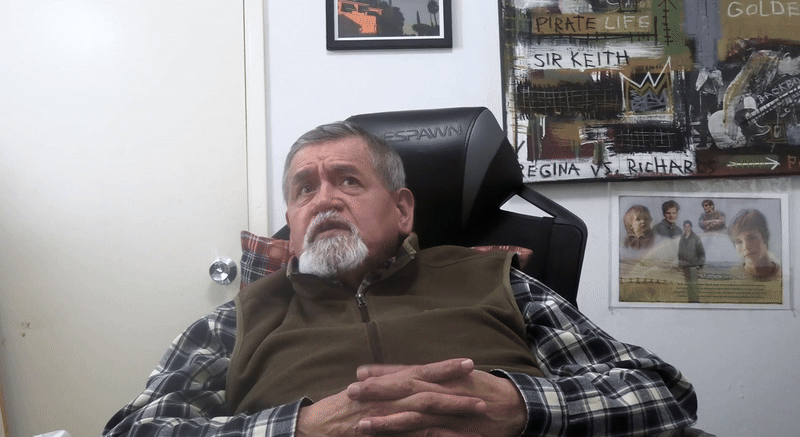RON PUNIT AUERBACHER
- LGBTQHP
- Dec 26, 2023
- 4 min read
Updated: Apr 5, 2025
NEW YORK CITY GAY LIBERATION FRONT

As we approach the conclusion of 2023, we reflect on a year marked by notable achievements and look ahead to a promising 2024. After meticulously cataloging our archives, we are excited to share that our repository now includes over 1,200 audio recordings.
For nearly five years, we worked to locate our interview with Ron Punit Auerbacher, a key figure associated with the New York City Gay Liberation Front. We appreciate Ron's patience in awaiting our feature. The rediscovery of the tape, previously thought to be buried in unlabeled recordings, is a brief yet enduring moment of success.
Born in St. Louis, Missouri, Ron survived the traumatic experiences of his early years, which he discusses with careful consideration, distancing himself from the associated pain. His narrative begins in October 1964, when, three weeks into college, he found himself institutionalized for almost three years.
After regaining his freedom, Ron pursued studies at New York University for two years. Disillusioned, he sought solace in a community-oriented setting. In 1969, during a stroll in the park, he encountered a flier promoting the inaugural Venceremos Brigade—a coalition of young activists expressing solidarity with the Cuban Revolution. The brigade was made up of individuals from across the United States who actively challenged U.S. policies, including the economic blockade and a ban on travel to Cuba.
Upon his return, Ron joined the New York City Gay Liberation Front, a group his friends were already active in. The New York City GLF, emerging after the 1969 Stonewall Rebellion, was pivotal in LGBTQ+ history, representing a true resistance involving blood, billy clubs, and marches.
Bringing Ron’s story to the present, he has subsequently been an Educational Volunteer, an instructor at the First Unitarian Universalist Church of San Diego, and an instructor at the Healing Hands School of Holistic Health. His unwavering belief in the power of holistic healing remains a guiding force.
—August Bernadicou, Executive Director of The LGBTQ History Project

"When I was 18 and went to college, I had what they called at that time a ‘nervous breakdown.’ I couldn't study, and part of that was the emerging realization that I was gay. For example, I read Giovanni's Room and The City and the Pillar and slowly realized who I was.
Shortly after I started college, I was hospitalized in a mental institution. First, I was at a ‘closed hospital’ and, later, an ‘open hospital.’ I wouldn't blame my hospitalization entirely on being gay, which was a psychiatric diagnosis at the time. I can understand that the doctors were probably afraid I was gonna kill myself. I also had a lot of family trauma going on. In some ways, there was native intergenerational trauma, and my mother was absolutely mentally ill. Can you separate being mentally sick from being a very intelligent woman who's forced to be a housewife in the 1950s? I don't think so.
Rebellious patients and the ones who talked back received electric shock therapy. It was very frightening to see people coming back from electric shock therapy. They were like zombies—the staff would wrap people in ice packs to calm them down.
It's hard to remember all of this, but I can remember how difficult it was. So many people I met in the Gay Liberation Front in New York accepted who they were, and they made it seem so natural and easy. They were young when they came to terms with it. I had absolutely imbibed that there was something incredibly wrong and shameful. It would literally take me maybe 20 minutes to mention same-sex attraction to the psychiatrist.
The second hospital, which was open, where you could go outside, was in New England. There was a genius theater director who had an intuitive skill of working with people, and she never saw the patients as patients. She saw us as potentially creative theater people, and we put on absolutely professional theater productions. People came from Massachusetts to see us perform. It was impossible to get tickets! It was sold out all the time.
She’s not alive anymore, but I always told her that she saved my life by showing kindness and that treating someone as a creative human being was much more productive than sitting in therapy analyzing. I don't believe I learned anything in the hospital, but the director helped me recognize my talent. I loved it and felt alive on stage, planning and creating the situation. I was also her assistant director.

After I was discharged, I went to New York University. I couldn't stand it because the emphasis wasn't on working communally or collectively. It was about competition and how cutthroat the world was. So, I quit after two years and didn’t know what I was going to do. I saw a flier in the Village in New York about the trip to Cuba with the Venceremos Brigade, a coalition of young people, to show support for the Cuban Revolution by working alongside Cubans. I was really interested in the concept of how an alternative form of governance and society might function.
It certainly was different. We were there for two months, and we were in a very controlled environment. We were out in the countryside, living in tents with English-speaking Cubans, cutting sugar cane and farming. On Sundays, we would travel in buses to visit cement factories. There was a lot of enthusiasm and cooperation: ‘Here’s what we can do together if we work together.'"





Comments